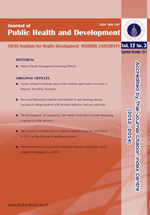Preemptive analgesia in patients undergoing appendectomy at Debaratana Nakhon Ratchasima Hospital, Thailand
Main Article Content
Abstract
Preemptive analgesia through infiltration of anaesthetics into surgical wounds before the incision is effective in various elective surgeries. Although this application can decrease postoperative pain, it is not known whether it is effective in surgery with acute pain. This study, therefore, evaluated whether the application of a preincisional local anaesthetic decreased the postoperative pain in patients undergoing an appendectomy for acute appendicitis.
The sample was seventy-five consecutive patients admitted to Debaratana Nakhon Ratchasima Hospital with a tentative diagnosis of acute appendicitis. Patients were randomly divided into two groups. For group 1, the study group of thirty-five cases, 2% lidocaine with adrenaline (epinephrine) 1:200,000 was injected to the planned incision site cutaneously, subcutaneously under the fascia of the external oblique muscle. Group 2, the control group of forty cases received the same volume of saline injection to the anatomical site. One milligram per kilogram meperidine was administered intravenously to both groups for postoperative analgesia. If required, a further 0.5 mg/kg of meperidine was administered. Postoperative pain was assessed by a visual analog scale during the first 24 hr. The analgesic and the doses required were recorded. All data were stored using SPSS 11.0 for Windows. The Mann-Whitney U-test was used to compare data between the two groups when the data were in a non-normal distribution.
No statistically significant difference was found between the pain scores of the two groups, the number of patients who needed analgesic and the amount and number of doses administered. Preincisional local anaesthetic infiltration did not decrease the need for postoperative analgesic use in patients with acute pain.


